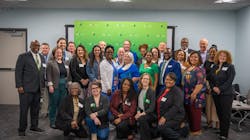GoTriangle, Triangle Family Services host event focused on shared challenges
GoTriangle and nonprofit Triangle Family Services hosted the second “Springing Into Action: An Issues-Oriented Conversation” event on March 23 at GoTriangle’s executive headquarters in Durham, N.C.
GoTriangle and nonprofit Triangle Family Services began work last year on the effort to share resources to help homeless people after noticing a rise in the number of people riding transit and staying at transit shelters and stations because they had no permanent place to call home.
“We’re delighted to host this event,” said GoTriangle President and CEO Charles Lattuca in welcoming participants. “It brings together regional transit officials and community partners to share ideas and programs that can help bring much needed services to some of our disadvantaged riders, many of whom are homeless.”
GoTriangle’s Manager of Safety, Security and Training Jimmy Price noted that since GoTriangle suspended fares in March 2020, the agency has seen security incidents related to non-destination riders jump from 17 that year to 42 in 2021 and 55 in 2022. These incidents have ranged from policy violations by passengers riding all day and refusing to get off a bus (or not wearing masks during the pandemic) to fights on the bus and mentally ill passengers. This uptick has led to bus operators’ dealing with negative interactions with riders, having to place more calls for assistance to dispatchers requesting law enforcement and operator job attrition.
Price said he came to the event hoping to gain more information and training resources from outreach agencies to continue training bus operators on conflict resolution, de-escalation skills, mental health awareness and how to respond to homeless riders’ needs.
Seaira Green, Triangle Family Services’ chief program officer, said she was delighted to be part of the conversation for her agency, which serves the Triangle with social service resources. She said Triangle Family Services saw an increase in homelessness referrals for emergency services from 15 percent to 22 percent during the COVID-19 pandemic. She explained her agency’s goal was to help vulnerable people find resources, so law enforcement does not have to get involved. She noted many of her agency’s clients have had run-ins with law enforcement due to their violations on public transit, so she realized transit was a place where her agency needed to be.
“They are on the bus riding because they have nowhere to go, because they are homeless, so how can we get in the same space as public transit as a social service provider that has the mentality of meeting people where they are?” Green said. “We recognize this thing is bigger than Triangle Family Services and GoTriangle, so we began reaching out to other community partners.”
During the meeting, proposals for improvement emerged, including specific sources for training transit employees, donating water bottles labeled with social service resources and paying trained “ambassadors” to reach out to vulnerable populations at transit centers.
The ambassador program would clearly be a part of the resources in the future, said Sig Hutchinson, chair of GoTriangle’s Board of Trustees, who attended the meeting and said he took detailed notes.
“One, thank you for being here,” he said to the participants. “Two, what you said today is important. Three, we will be acting on what you said today and improving even more moving forward.”


